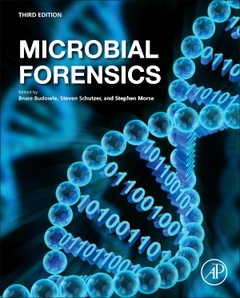Microbial Forensics (3rd Ed.)
Coordonnateurs : Budowle Bruce, Schutzer Steven E., Morse Stephen A.

Microbial Forensics, Third Edition, serves as a complete reference on the discipline, describing the advances, challenges and opportunities that are integral in applying science to help solve future biocrimes. New chapters include: Microbial Source Tracking, Clinical Recognition, Bioinformatics, and Quality Assurance. This book is intended for a wide audience, but will be indispensable to forensic scientists and researchers interested in contributing to the growing field of microbial forensics. Biologists and microbiologists, the legal and judicial system, and the international community involved with Biological Weapons Treaties will also find this volume invaluable.
ARNOLD F. KAUFMANN AND PAUL KEIM
2. The FBI’s Amerithrax Task Force and the advent of microbial forensics
R. SCOTT DECKER AND TERRY L. KERNS
3. Microbial forensic investigation of the anthrax letter attacks: how the investigation would differ using today’s technologies
PAUL J. JACKSON
4. Foodborne outbreaks
E.W. BROWN AND M.W. ALLARD
5. Forensic plant pathology
JACQUELINE FLETCHER, NEEL G. BARNABY, JAMES BURANS, ULRICH MELCHER, DOUGLAS G. LUSTER, FORREST W. NUTTER, JR., HARALD SCHERM, DAVID G. SCHMALE, III, CARLA S. THOMAS, AND FRANCISCO M. OCHOA CORONA
6. Microbial source tracking: characterization of human fecal pollution in environmental waters with HF183 quantitative real-time PCR
ORIN C. SHANKS AND ASJA KORAJKIC
7. Influenza forensics
ANGELA CHOI AND ADOLFO GARCÍA-SASTRE
8. Forensic public health: epidemiological and microbiological investigations for biosecurity
ALI S. KHAN, PHILIP S. AMARA, AND STEPHEN A. MORSE
9. Forensic analysis in bacterial pathogens
PAUL KEIM, JASON W. SAHL, TALIMA PEARSON, AMY VOGLER, CHARLES H. WILLIAMSON, DAWN BIRDSELL, RICHARD T. OKINAKA, JEFFREY T. FOSTER, AND DAVID M. WAGNER
10. Genomic epidemiology and forensics of fungal pathogens
DAVID M. ENGELTHALER AND ANASTASIA P. LITVINTSEVA
11. Forensic human identification using skin microbiome genetic signatures
SARAH E. SCHMEDES, AUGUST WOERNER, AND BRUCE BUDOWLE
12. Using microbiome tools for estimating the postmortem interval
HEATHER DEEL, SIBYL BUCHELI, AERIEL BELK, SAM OGDEN, AARON LYNNE, DAVID O. CARTER, ROB KNIGHT, AND JESSICA L. METCALF
13. Select methods for microbial forensic nucleic acid analysis of trace and uncultivable specimens
RACHEL E. KIESER AND BRUCE BUDOWLE
14. The use of host factors in microbial forensics
STEVEN E. SCHUTZER
15. Toxin analysis using mass spectrometry
THOMAS A. BLAKE, SUZANNE R. KALB, RUDOLPH C. JOHNSON, AND JOHN R. BARR
16. Ricin forensics: comparisons to microbial forensics
JEFFREY T. FOSTER, ROBERT L. BULL, AND PAUL KEIM
17. Proteomics for bioforensics
ERIC D. MERKLEY, BROOKE L. DEATHERAGE KAISER, DAVID S. WUNSCHEL, AND KAREN L. WAHL
18. Rapid bacterial typing in the postgenomic era: developments in computational methods
HECTOR F. ESPITIA-NAVARRO, LAVANYA RISHISHWAR, LEONARD W. MAYER, AND I. KING JORDAN
19. Genomics
TOM SLEZAK, JONATHAN ALLEN, AND CRYSTAL JAING
20. Design of genomic signatures for pathogen identification and characterization
TOM SLEZAK, BRADLEY HART, AND CRYSTAL JAING
21. Collection and preservation of microbial forensic samples
JENIFER A.L. SMITH
22. Assessment of the threat
JENIFER A.L. SMITH AND DAVID R. HODGE
23. Scientific testimonial standards for microbial forensic evidence
STEPHAN P. VELSKO
24. Inferential validation and evidence interpretation
STEPHAN P. VELSKO
25. Microbial forensic investigations in the context of bacterial population genetics
PAUL KEIM, TALIMA PEARSON, BRUCE BUDOWLE, MARK WILSON, AND DAVID M. WAGNER
26. Use of microbial forensics data in scientific, legal, and policy contexts
CHRISTOPHER A. BIDWELL AND RANDALL MURCH
27. Lessons for expert witnesses
STEPHEN A. SALTZBURG
28. Select agent regulations
STEPHEN A. MORSE AND BERNARD R. QUIGLEY
29. Biorepositories and their foundation
FRANK P. SIMIONE, RICHARD R. VINES, AND TED D. MULLINS
30. The National Bioforensic Analysis Center
JAMES BURANS, JENNIFER S. GOODRICH, ROBERT L. BULL, AND NICHOLAS H. BERGMAN
31. An international microbial forensics research strategy and its collaborative pursuit is needed
RANDALL MURCH AND BRUCE BUDOWLE
32. Education and training in microbial forensics
STEVEN B. LEE, DEETTA K. MILLS, STEPHEN A. MORSE, STEVEN E. SCHUTZER, BRUCE BUDOWLE, AND PAUL KEIM
33. Microbial forensics: what next?
STEPHEN A. MORSE, BRUCE BUDOWLE, AND STEVEN E. SCHUTZER
Secondary: Microbiology researchers; attorneys, law enforcement and intelligence communities; post-graduate students of forensic science and the international community involved with Biological Weapons Treaties.
Steven Schutzer, MD is a physician-scientist who trained and was on the faculty at Cornell University Medical College, New York Hospital, and Rockefeller University, before joining New Jersey Medical School. His research has focused on the interface of the immune system and microbes. Particular areas of research interest are Lyme and Tick diseases, neuroimmunology, and immunology. Dr. Schutzer is board certified in Internal Medicine, Allergy and Clinical Immunology, and Clinical Laboratory Immunology. Dr. Schutzer’s research is funded by the National Institutes of Healt
- Presents new and expanded content that includes a statistical analysis of forensic data, legal admissibility and standards of evidence
- Discusses actual cases of forensic bioterrorism
- Includes contributions from editors and authors who are leading experts in the field, with primary experience in the application of this fast-growing discipline
Date de parution : 12-2019
Ouvrage de 526 p.
19x23.3 cm
